|
|
|
Sort Order |
|
|
|
Items / Page
|
|
|
|
|
|
|
| Srl | Item |
| 1 |
ID:
173856


|
|
|
|
|
| Summary/Abstract |
This research investigates the contentious use of temple assets amid widespread local state-led religious commodification in contemporary China. Based on a comparative analysis of 22 historic temples, this paper argues that given the choice, temple leaders strive for property-management autonomy, which they negotiate on two fronts. Externally, owing to the immobility of historic temple assets, temple leaders avoid antagonizing local state agents by demonstrating political conformity and the temple's economic contribution. Internally, they seek to build a donation-based merit economy to sustain the monastic institution. Since such autonomy must operate within the authoritarian state's regulatory framework, the restrained contestation of the religious leadership actually helps to strengthen state control over religion.
|
|
|
|
|
|
|
|
|
|
|
|
|
|
|
|
| 2 |
ID:
173857


|
|
|
|
|
| Summary/Abstract |
To what degree are Chinese citizens concerned about the seriousness of global warming and climate change (GWCC) and what are the key factors that shape their concern? Drawing theoretical insights from extant literature and using recent data from a national representative public survey (N = 3,748) and provincial environmental and economic statistics, this study, the first of its kind, examines the variations and determinants of Chinese GWCC concern. Our data show that in China, compared to other countries, average public concern about GWCC is relatively low, and concern varies greatly among Chinese citizens, across different provinces and between coastal and inland areas. Statistical analyses reveal that the levels of Chinese GWCC concern are significantly influenced by individual sociodemographic characteristics, personal post-materialist values, and regional economic dependency on carbon-intensive industries. Specifically, women and younger Chinese with greater post-materialist values are more concerned about GWCC than their counterparts, and citizens from provinces with higher economic dependency on carbon-intensive industries tend to be less concerned about GWCC than people from provinces with lower carbon dependency. We discuss key policy implications and make suggestions for future research in the conclusion.
|
|
|
|
|
|
|
|
|
|
|
|
|
|
|
|
| 3 |
ID:
173853


|
|
|
|
|
| Summary/Abstract |
A seismic change in the residential pattern is emerging in rural China today: traditional rural houses have been rapidly erased from the face of the countryside with large numbers of peasants being relocated to modern high-rise buildings. This process of “peasant elevation” has had a monumental impact on rural China. It redefines the entitlement to land use by the rural citizenry and negotiations for a new regime of property rights concerning land administration, while, most importantly, it undermines the position of the local state in rural China, whose authority is an aggregation of three distinctive elements: coercive power inherent in the state apparatus, control over economic resources, and resonance with local morality. Based on original data collected in Chongqing, Nantong and Dezhou, this paper argues that the comprehensive uprooting of the Chinese peasantry from the land and the resulting complications have caused moral disorientation among the relocated peasants and fragmentation of local authority. The difficulty in establishing community identity in the new setting has further undermined local governance. This may in turn trigger a wave of social and political tensions that may eventually turn out to be a major political challenge to the regime for years to come.
|
|
|
|
|
|
|
|
|
|
|
|
|
|
|
|
| 4 |
ID:
173861
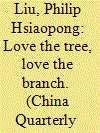

|
|
|
|
|
| Summary/Abstract |
Chinese national identity has long been considered to have been an obstacle to Singapore's nation-building efforts. This is mainly because China was suspected of using its ethnic links to encourage Singapore's communist rebellions during the 1950s and 1960s as Lee Kuan Yew was working towards establishing the city state. This study reviews Lee's exchanges with Beijing and argues that he gave China the impression that he was building an anticolonial, pro-China nation. Beijing therefore responded positively to Lee's requests for support. Reiterating its overseas Chinese policy to Lee, Beijing sided with him against his political rivals and even acquiesced in his suppression of Chinese-speaking “communists.” In addition, China boosted Lee's position against Tunku Abdul Rahman, supported Singapore's independence and lobbied Indonesia to recognize the territory as a separate state. China thus actually played a helpful role in Singapore's nation building.
|
|
|
|
|
|
|
|
|
|
|
|
|
|
|
|
| 5 |
ID:
173855
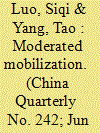

|
|
|
|
|
| Summary/Abstract |
In response to a series of strikes in south China in 2010, a new model of collective bargaining has emerged, featuring what this article describes as “moderated mobilization.” Distinct from what is typically known as China's quadripartite industrial relations system, whereby workers are separated from the party-state, official trade unions and employers, this model shows workers and enterprise-level trade unions in collaboration with one another. According to our observations from 2012 to 2017, some enterprise unions have successfully mobilized workers throughout the collective bargaining process. These unions are democratically elected by workers and are relatively independent from the official authorities. At the same time, they have “moderated” such mobilization particularly to reduce labour militancy, given the political and institutional constraints within which they must work. The implication of this new model is significant. Although it might be far from solving the quadripartite dilemma, it has signalled an increase in local initiatives among enterprise unions – a previously neglected but pragmatically favourable channel for workers.
|
|
|
|
|
|
|
|
|
|
|
|
|
|
|
|
| 6 |
ID:
173852


|
|
|
|
|
| Summary/Abstract |
This paper examines the nature of China's current research climate and its effects on foreign scholarship. Drawing on an original survey of over 500 China scholars, we find that repressive research experiences are a rare but real phenomenon and collectively present a barrier to the conduct of research in China. Roughly 9 per cent of China scholars report that they have been “invited to tea” by authorities within the past ten years; 26 per cent of scholars who conduct archival research report being denied access; and 5 per cent of researchers report some difficulty obtaining a visa. The paper provides descriptive information on the nature of these experiences and their determinants. It concludes with a discussion of self-censorship and strategies for conducting research on China.
|
|
|
|
|
|
|
|
|
|
|
|
|
|
|
|
| 7 |
ID:
173859


|
|
|
|
|
| Summary/Abstract |
Applying a novel approach based on online query volume data, this study provides the first large-scale portrait of revolutionary nostalgia among the Chinese, undertaking an empirical analysis of how the aggregate level of nostalgia is shaped. For each Chinese province, we use the normalized frequency of searches for red songs on Baidu, the most widely used online search engine in China, to quantify the local level of nostalgia. We find that the evolving trends of nostalgia among the provinces are similar but stratified. The results from the dynamic panel data analysis using the Generalized Method of Moments indicate that revolutionary nostalgia is significantly affected by a set of socio-economic determinants, including GDP per capita, income inequality, social development, legal development and the degree of globalization.
|
|
|
|
|
|
|
|
|
|
|
|
|
|
|
|
| 8 |
ID:
173851
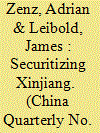

|
|
|
|
|
| Summary/Abstract |
Following a series of high-profile attacks in Beijing, Kunming and Urumqi by Uyghur militants, the Chinese party-state declared a “war on terror” in 2014. Since then, China's Xinjiang region has witnessed an unprecedented build-up of what we describe as a multi-tiered police force, turning it into one of the most heavily policed regions in the world. This article investigates the securitization of Xinjiang through an analysis of official police recruitment documents. Informal police jobs, which represent the backbone of recent recruitment drives, have historically carried inferior pay levels. Yet, advertised assistant police positions in Xinjiang now offer high salaries despite low educational requirements, thereby attracting lesser-educated applicants, many of whom are ethnic minorities. Besides co-opting Uyghurs into policing their own people, the resulting employment is in itself a significant stability maintenance strategy. While the known numbers of violent attacks have subsided, China's heavy-handed securitization approach risks alienating both minority and Han populations.
|
|
|
|
|
|
|
|
|
|
|
|
|
|
|
|
| 9 |
ID:
173854
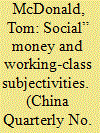

|
|
|
|
|
| Summary/Abstract |
Scholars of Chinese society have predominantly regarded the region's money to represent an unusually “social” artefact. The dramatic proliferation of “digital money” services within Chinese social media platforms in the last decade would seem to further confirm the social character of Chinese money. I present a comparison of the diverse views held by migrant factory workers in Shenzhen towards different digital payment platforms which, however, suggests that rather than digital money necessarily being more or less social, different platforms instead extend the possibilities of sociality in varying ways. I argue that acknowledging the production of such novel working-class subjectivities through digital money ought to be central to efforts to assess the potential of these technologies for addressing the social, institutional and economic exclusions faced by Chinese migrant labourers. This in turn can enrich our understanding of the emergence of a new “digital working-class” in China by revealing how such contemporary working-class subjectivities are shifting, contextual and processual in nature.
|
|
|
|
|
|
|
|
|
|
|
|
|
|
|
|
| 10 |
ID:
173850
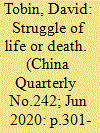

|
|
|
|
|
| Summary/Abstract |
In July 2009, nearly 200 people were killed in ethnically targeted mass violence between Turkic-speaking Muslim Uyghurs and Han Chinese in Urumqi, overshadowing the 60th anniversary of the founding of the People's Republic of China (PRC). How have ethnic relations between Han and Uyghurs descended into mass violence among ordinary people? This paper argues that the party-state exacerbates ethnic tensions between Han and Uyghurs through ethnocentric security narratives. These narratives frame China's identity as being under threat from Turkic enemies within who are supported by Islamic terrorists and Western “enemies of China” from outside. Discourse analysis of official texts, participant-observation of security practices, and interviews with Han and Uyghurs reveal the interplay between official identity discourses and everyday security practices before, during and after the violence. Since July 2009, one official solution to ethnic violence has been the construction of a shared multi-ethnic identity, officially described as a “zero-sum political struggle of life or death.” However, Han-centric conceptualizations of ethnic unity promote Han chauvinism and portray the Uyghur as a security threat. The party-state thus creates hierarchical ethnic relations that exacerbate both Han and Uyghur insecurities and contribute to spirals of violence. China's extra-judicial internment camps in Xinjiang are the logical conclusions of the ethnocentric insecurity cycles analysed in this article.
|
|
|
|
|
|
|
|
|
|
|
|
|
|
|
|
| 11 |
ID:
173858


|
|
|
|
|
| Summary/Abstract |
Non-medical costs, including costs associated with carers, travel, food and accommodation for family members who care for older people during their medical visits, can constitute a substantial part of total healthcare costs, especially for older people. Using data from the 2015 China Health and Retirement Longitudinal Survey, this study examines the effects of such non-medical costs on catastrophic health payments and health payment-induced poverty among older people in China. Results indicate that non-medical costs account for approximately 18 per cent of total inpatient costs. The percentage is highest for those in the lowest economic brackets. Rural populations are more likely than urban populations to incur catastrophic health payments and suffer from health payment-induced poverty. Non-medical costs increase the chances of older people incurring catastrophic health payments and suffering from health payment-induced poverty. These findings suggest that policymakers should look to develop new policies that facilitate reimbursement of non-medical costs, particularly for the rural population.
|
|
|
|
|
|
|
|
|
|
|
|
|
|
|
|
| 12 |
ID:
173860
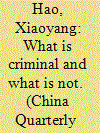

|
|
|
|
|
| Summary/Abstract |
The Chinese Communist Party (CCP) prosecuted Japanese military servicemen for war crimes committed during and after the Sino-Japanese War. This paper examines written confessions left by those Japanese war crimes suspects and considers to what extent they were used by the CCP to prosecute sexual violence during the trials. The historical analysis is contextualized by an examination of the representation of the CCP's legal approach to sexual violence in articles from the People's Daily. This paper finds that although accounts of sexual violence are found in the confessions written by suspected Japanese war criminals, the courts did not make rape a focal point of the prosecutions and did not pursue the so-called “comfort women” issue. Furthermore, no victim of rape was called to testify before the court. The CCP's approach to the issue of sexual violence in the 1956 trials closely corresponded to the discourse and propaganda in the People's Daily.
|
|
|
|
|
|
|
|
|
|
|
|
|
|
|
|
|
|
|
|
|